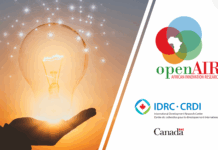Open AIR Ottawa’s Inaugural Distinguished Speaker Series: Professor Osei-Tutu “Redefining Intellectual Property”
By Katie Degendorfer
Too often, scholarly work and debates relating to Intellectual Property (IP) have focused on the protection and profits of the IP holder, as opposed to promoting open-access and the broader interests of the community. In her talk at the University of Ottawa on February 9th, Professor Janewa Osei-Tutu suggested we readjust the lens through which IP innovation is examined, using human development as the standard.
Professor Janewa Osei-Tutu, an Associate Professor of Law at Florida International University, was invited for the Open AIR network’s inaugural Distinguished Speaker Series session, conducted jointly with the University of Ottawa Centre for Law, Technology and Society. Professor Osei-Tutu’s talk is the beginning of a series of discussion that Open AIR will be hosting over the next several years.
Professor Osei-Tutu received her J.D. from Queen’s University and an L.L.M. from McGill University where she studied International and Comparative Law. Since then she has worked for the Canadian government, was an Associate Legal Officer at the UN International Criminal Tribunal for Rwanda, and more. Professor Osei-Tutu’s current work focuses on the social and cultural impact of intellectual property protection. In her talk at the University of Ottawa, entitled “Redefining Intellectual Property Progress”, Prof. Osei-Tutu focused on shifting the current framing of IP to justify it within the broader context of improving human development.
In her talk – which is now available on YouTube – Osei-Tutu explored the idea that the impact of IP on an individual is not usually a central concern when assessing the impact of IP policies. Typically, IP policy development focuses on the protection of profits.
In her presentation, Osei-Tutu suggested that this focus on profit results from too much attention on economic data sets as the primary measure of successful IP innovation. Instead, she proposed using the Human Development Index (HDI) as a metric to evaluate IP policy so as to promote the betterment of society in a broader sense. By using the HDI, Professor Osei-Tutu suggested that the impacts of IP on areas such as health, life expectancy, and education, can be better understood and measured to determine policy impacts and better guide decision-making.
Although human development has been considered on the periphery of IP policy innovation, Osei-Tutu’s approach puts it at the center of these debates. By using the HDI, IP can promote a more open concept approach and play an important role in the empowerment of communities. Assessing the impacts of IP innovation using the HDI as a sign post, will demonstrate the impact on both the individual and the community level and will help to inform long terms strategies.
Indeed, shifting the focus to human development could help to redefine progress in the IP sector and help contextualize IP policy impacts at a more human level. For individuals concerned about the impact of IP relating to traditional knowledge and indigenous and local communities, this would likely be a helpful re-characterization that can empower and promote innovation.
The talk was well received, with a broad audience that included students, professors, academics, and diplomats. For a student such as myself, the focus on HDI was valuable because it highlighted the importance of examining the human-side of IP policy development. As someone with pre-law research experience related to education and not IP, this talk helped to bridge the gap between the two areas and demonstrated how they can be mutually beneficial. This readjustment can encourage open content and access, a theme at the heart of Open AIR’s collaborative research network objectives. The Distinguished Speaker Series at the University of Ottawa will continue to examine IP issues through a variety of lenses with speakers from a range of backgrounds and is exemplary of the range of academic opportunities that Open AIR encourages. We are lucky that Professor Osei-Tutu kicked off what will no doubt be a very successful Series.










